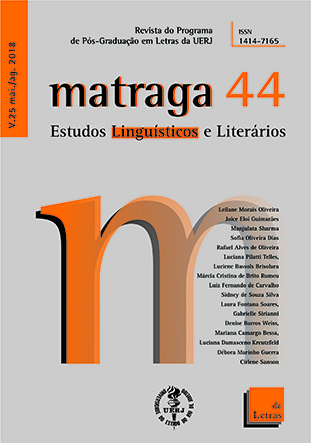Português como língua não materna: relatos de imigrantes bolivianos
DOI:
https://doi.org/10.12957/matraga.2018.33842Palavras-chave:
imigração, aprendizagem de português, língua não materna, língua de acolhimento.Resumo
Neste estudo, focalizamos a percepção de imigrantes bolivianos sobre como adquiriram a língua portuguesa em situação de imersão por questões laborais na cidade de São Paulo, Brasil. Muitos afirmam que a oferta exígua de programas de ensino de Português como Língua Estrangeira os leva a adquirir o português no dia a dia em seu contato direto com outros falantes de português, isto é, como resultado das necessidades de usar esta língua em suas vivências cotidianas. Os dados aqui apresentados fazem parte de uma pesquisa maior desenvolvida segundo os princípios da etnografia, que têm como objetivo compreender como a língua portuguesa, neste caso não materna, foi se tornando parte da vida cotidiana de cada um dos imigrantes aqui focalizados.Downloads
Downloads
Publicado
Como Citar
Edição
Seção
Licença
AUTORIZAÇÃO
A Matraga – Revista do Programa de Pós-Graduação em Letras da UERJ está autorizada a publicar o artigo ora submetido, caso seja aceito para publicação online. Fica atestado que a contribuição é original, que não está sendo submetida a outro editor para publicação, e que a presente declaração é a expressão da verdade.
Os trabalhos publicados no espaço virtual da Matraga – Revista do Programa de Pós-Graduação em Letras da UERJ serão automaticamente cedidos, ficando os seus direitos autorais reservados à Matraga. Sua reprodução, total ou parcial, é condicionada à citação dos autores e dos dados da publicação.

A Matraga utiliza uma Licença Creative Commons - Atribuição-NãoComercial 4.0 Internacional.





